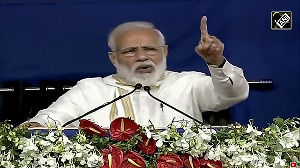Fixed interest rates of home loans have swung from a low of 7 per cent in 2003 to 13.5 per cent now, and industry experts finally believe that they have peaked. Says Kapil Wadhawan, vice-chairman and MD of Dewan Housing Finance Corporation: "If rates go up any further, it will begin to hurt customers and the entire economy will be impacted. The corporate sector will be pressured. A further hike in interest rates is not advisable.
"Though there is a lingering concern about inflation and high liquidity, and the Reserve Bank of India might be forced to intervene and increase the CRR further, the rates should stabilise in the next six to eight months." Some experts say that even if there is an increase in interest rates, it would be very marginal - not more than 50 basis points.
Why you should not go for fixed rates. If interest rates have peaked, as most indicators seem to suggest, then there is no point in opting for a fixed rate home loan. The irony is that most banks and housing companies are now trying to push home loans at fixed rate. "A fixed rate regime is a strong interest regime," says Wadhawan. "Fixed rate should be preferred even if it seems high."
However, Harsh Roongta, CEO of Apnaloan.com, roots for floating rates for home loans in the current scenario. He says there is no need to pay the 2 per cent premium that the fixed rate loan would entail. "Even if interest rates go up marginally, the impact on floating rates would still be less than 2 per cent," he says.
Roongta is certain a new cycle of interest rates will begin. "Interest rates will go down and come up again. One cannot say when that will happen, but it is bound to happen," he says.
Financial planner Zankhana Shah adds that whether floating is favourable or not, you should have the means to change to the fixed rate when the situation demands. This means that you should set aside cash to pay the penalty for switching over. "Or else, make sure to go for a floating rate with a lower tenure," she says. "Also, it is difficult to predict beyond four to five years in the interest rate market, whereas home loans usually have a horizon of 15 years."
Her advice is also that you should ideally wait till there is some clarity on the direction interest rates are likely to take. She says: "In our country, fixed is never fixed and floating is never floating. And so, it may just happen that your floating rate of interest on the home loan does not go down after an overall fall in interest rates."
Roongta concurs with Shah on the practice in India regarding fixed and floating rate home loans. "Customers should be vigilant about the contracts they sign with banks," he cautions. "Do not settle for a half-floating or a half-fixed rate loan. Most banks in our country do not offer a pure floating rate or a pure fixed rate. If the bank is denying you a pure fixed rate or a pure floating rate loan, then take up the issue with the concerned authorities."
Do you need to switch over? The near unanimous view today is that interest rates are unlikely to go higher than their current levels, even when they rise again in the next cycle. By this token 14 per cent is likely to be the highest that housing loans would cost. If that is the case, then it is certainly not prudent to take a fixed rate home loan. If need be, you could even convert a high fixed rate loan to a floating rate one.
Shifting from fixed to floating rate makes sense only if the fixed rate is higher than the current floating rate (see Should You Convert From Fixed to Floating?)
What you need to do. It would be best to wait for clarity to emerge on the likely future of interest rates before taking a loan to buy a house. But if you want to buy right away, then opt for a lower tenure of the home loan. And if you must take a loan with a high tenure, then keep money aside to pay the penalty for switching back to fixed, in case the need for doing that arises.
Should You Convert From Fixed to Floating?
Don't change to floating rate if you took a loan about four years back at a fixed rate that is below the current floating rate and, in case it is not a purely fixed rate loan, the bank has not yet revised the rate. "Decide after the rate changes to the current levels," says Harsh Roongta.
Don't switch over if you took a loan about a year back at a fixed rate that is close to the current floating rate. Rates have not yet been revised to current levels for loans that are not purely fixed.
Convert if you took a fixed rate loan recently at 13.5%, which is above the current floating rate levels. The total EMI for the floating rate plus the penalty for shifting (close to 1.75% of the outstanding amount) should not exceed the total EMI for the fixed rate loan. Weigh the tax benefits for both scenarios too.
Assumptions: Current floating rate is 11.5%, fixed rate is 13.5%.







 © 2025
© 2025